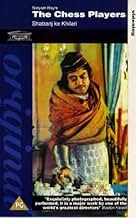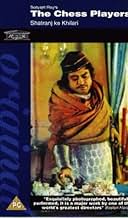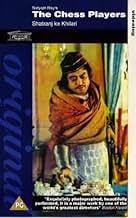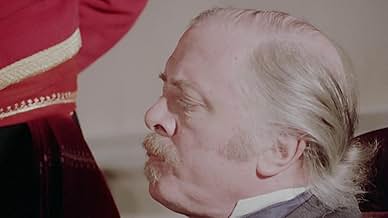Wazed Ali Shah fue el gobernante de uno de los últimos reinos independientes de la India. Los británicos, con la intención de controlar este país rico, habían enviado al general Outram en un... Leer todoWazed Ali Shah fue el gobernante de uno de los últimos reinos independientes de la India. Los británicos, con la intención de controlar este país rico, habían enviado al general Outram en una misión secreta para destronarlo.Wazed Ali Shah fue el gobernante de uno de los últimos reinos independientes de la India. Los británicos, con la intención de controlar este país rico, habían enviado al general Outram en una misión secreta para destronarlo.
- Dirección
- Guión
- Reparto principal
- Premios
- 4 premios y 3 nominaciones en total
- Prime Minister
- (as Victor Bannerji)
- Aqueel
- (as Farooque Shaikh)
- Abbajani
- (as Budho Advani)
Reseñas destacadas
The film contains two narratives. One narrative focuses on the political machinations of the bullish, pragmatic representative of the British, General Outram, played capably by Richard Attenborough, and the diffident response of the cultured but cloud-headed Indian Muslim King of Oudh, played with great feeling by Amjad Khan.
The other narrative shifts focus to the tragi-comic situation of two well-born Indian Muslim gentlemen, played by the always-wonderful Saeed Jafarey and Sanjeev Kumar, and their obsession with a game of chess, leading them to neglect the momentous tide of history which is about to sweep over them. Indeed, not only is chess a metaphor for the power struggle between Indian and British, but the two chess players' family situations are too, with both men locked into domestic struggles with their wives, the haughty, beautiful Khurshid, played with characteristic commitment by Shabana Azmi and the lascivious, lying Nafisa, well-played by Farida Jalal.
The twin approach is useful and well integrated, and there is even some humorous animation. Ray brings his characteristic eye for ravishing beauty, balanced with his close, sympathetic interest in humanity, particularly when under pressure, and a real feeling for the period. Also typical is the universality of the director's humanitarian outlook, with the nominally Hindu Ray studying Muslims and the British with the same warm but clear-eyed assiduousness.
Overall, this is a film, like all of Ray's films, to treasure, not only for a person of Indian ancestry such as myself.
He showed us his mastery in costumes, their colors, landscape and above all the tempo and dialogs. Especially the one to one talks of Mir and Mirza are great (all are in Proper Urdu which is common in that era). From lighting (the sunsets in the end) to capturing the true emotions (the way he showed the desperation of two wives) is remarkable. Setting of the movie from the very first scene to the end is just amazing in a sense how he tackles different issues to recreate that era.
Acting is pretty good from Mir and Mirza. Rest is just doing their part well.
Then there are some film makers whose movies transcend language and region. Film makers like the late Academy Award winner Satyajit Ray sa'ab. OK - I will admit. Except for a few brief scenes from 'Pather Panchali' I have not seen any other movie of this great man. Reason? Well, either it was the lack of the need to have to sit through a language I know nothing of and having to squint at the badly framed English subtitles or it was just plain desi callousness that believes the majority is usually right. You know, the classic Indian thinking that has the 'if everyone says it then it has to be great' attitude peppered all over it. I am sure there are millions out there who will still tell you that Satyajit Ray was an amazing movie maker without having seen a single frame he might have shot. Considering I too have indulged in such blatancy every now and then, 'Shatranj Ke Khiladi' seemed like the only chance I would get to savor Mr. Ray's cinematic beauty. After all, it was indeed the only Hindi/Urdu movie he made in his life, isn't it? Hence when I found the chance I took it.
Set in the late 1800s in the then Hindustan 'Shatranj Ke Khiladi' runs with two main stories parallel to one another. One – the larger of the two which shows a determinedly boorish English General Outram (a much younger looking Sir Richard Attenborough) pitted against Awadh's incompetent yet culturally aware Mughal King Wajid Ali Shah (a generously rotund Amjad Khan). The company wants to take over Awadh which remains the final province that is still run by royalty. So it decides to look past a decade old treaty that had promised that Awadh's royalty would never be lost. But, knowing the way the company ruled the sub-continent, the poetically humane King's defiance is brought under test as the concubine infested regal refuses to budge from his throne.
The second interestingly laid out strand is that of old buddies Mirza Sajjad Ali (a wonderfully flawless Sanjeev Kumar) and Mir Roshan Ali (an effervescent Saeed Jaffrey). These two upper middle class noblemen who sit around all day sucking at their well made hookahs and ignoring their frustrated spouses are absolutely obsessed with the game of chess. It is as if nothing – not even the lack of pawns to play with – can stop them from going at it well and good for a few hours each day. While Sajjad Ali's wife (Shabana Azmi is a small but well placed role) decides to find solace in the housekeeper's stories, Roshan Ali's wife (a chubby and visibly mischievous Fareeda Jalaal) chooses to find solace in the arms of a much younger man (a nervous Farooque Shaikh) right under the nose of her unsuspecting husband.
Ray beautifully juxtaposes the story of two chess players with the moves that take over their province and their lives as a foreign power enters their land. While the King is confronted by the orders of the Union Jack under the umbrella of the soulful songs he has composed, the chess players continue to find ways to get a good spot to sit down and well - play a good round of chess. A game, as it turns out, that ends up putting their friendship at stake just like the throne of their clueless King.
The one thing that comes off as obviously as the attention to pretentious 'paan holders' by these Lucknawi laat saahebs is Ray's understanding of the human condition in those times. The beautiful focus to detail of the surroundings only amplify the saga that unfolds eventually while the red vested British army marches into the Awadh province. Cinematography is crisp and captures the fading lights of the royal reign quite effectively. What struck me as more amazing was Ray's wonderful acknowledgement to the way such potentially affluent cultures used to work during that era. The fact that people in them would rather spend more time on keeping their indulgences alive than worry about their future under the Raj was an eye opener to say the least.
Performances wise everyone does his/her bit effectively. Seasoned actors Sanjeev and Saeed chip in a beautiful contribution. A young Amjad Khan (still fresh from the finely baked success as 'Gabbar Singh' in Sholay) delivers an earnest performance as the King who has his heart in the right place but his head in the wrong spot. As mentioned earlier, a tight lipped Sir Attenborough with a fluent Tom Alter play the scheming Englishmen who are preparing for Awadh's fall with orders from Her majesty the Queen.
All said and done 'Shatranj Ke Khiladi' definitely stands out as a Ray classic that is truly a testament to his life as a master story teller. I am glad that even if this is the only movie I will ever watch of Mr. Ray then at least it is based on a story by the legendary Shri Munshi Premchand. Could there be a better example of two Hindus coming together to design such a sensitive and relevant epic about the Muslim reign and culture? Unlikely, according to me.
Based on a short story by Prem Chand, the film is set in Lucknow, India in 1856 and is narrated by the real Amitabh Bachchan. As the film opens, we learn that Oudh's King Wajid Ali Shah (Amjad Khan) has financed the British East India Company for ten years and also provided soldiers for its army. In exchange, the Company did not interfere with Wajid's rule, even though they viewed the king with disdain. This changed in 1856 when General Outram (Richard Attenborough) was instructed to depose the king and take over the kingdom to add to the British coffers. Outram, the local representative of the Company, justifies his ambitions for more territory by denouncing the king to an aide as an incompetent ruler and hedonist, ignoring his devotion to dance, poetry, and music.
In another thread, two Indian aristocrats Mirza (Sanjeev Kumar) and Meer (Saeed Jaffrey) play chess obsessively to the dismay of their wives, Khurshid (Shabana Azmi), and Nafisa (Fardia Jalal). Mirza's wife feeling neglected, steals and hides the chess pieces, while Meer's wife has an affair with his nephew (Farooq Shaikh). Unwilling to handle their domestic affairs, the two first use fruits and vegetables as their set pieces, then seek other places to play their game, refusing to believe that the British takeover is imminent. One of their stops is the home of their attorney who is on his deathbed. This doesn't stop the two from hilariously trying to sneak in a game of chess in another room.
The two players cling to their way of life, exchanging frivolous banter and smoking hookah pipes while the world around them crumbles. They finally take refuge in the home of a young boy, Kullu (Samarth Narain) who remained while others fled just to see the red-coated British soldiers march into the city. While perhaps not in the upper echelon of Ray's work, The Chess Players is a very entertaining political satire that provides wry insight into human nature and our capacity for denial. General Outram is portrayed as a well-meaning but totally condescending individual who utterly fails to understand the lives and culture of the people he seeks to control. Any resemblance to current U.S. Muddle-East policies, of course, is purely accidental.
¿Sabías que...?
- CuriosidadesSatyajit Ray's only Hindi movie.
- Citas
Mir Roshan Ali: Jinse apni biwi-yan nahin sambhli woh angreaz fauz se kya ladenge. Translation : Those whom couldn't even care for their wives, would not be able to fight the British army.
- ConexionesFeatured in Celluloid Man (2012)
Selecciones populares
- How long is The Chess Players?Con tecnología de Alexa
Detalles
- Fecha de lanzamiento
- País de origen
- Idiomas
- Títulos en diferentes países
- The Chess Players
- Localizaciones del rodaje
- Indrapuri Studios, Calcuta, Bengala Occidental, India(studio: Indrapuri Studios, Calcutta)
- Empresa productora
- Ver más compañías en los créditos en IMDbPro
- Duración2 horas 9 minutos
- Mezcla de sonido
Contribuir a esta página

































